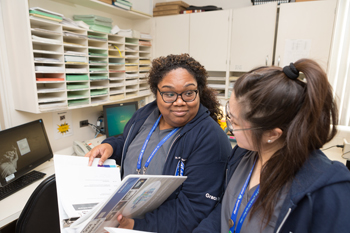Plan early, talk often: normalizing end-of-life planning in the cystic fibrosis clinic

By Emily Holton
- LIVE CHAT RECAP: Drs. Elizabeth Tullis & Anne Stephenson discuss cystic fibrosis treatment and research.

As RNAO best-practice-guideline champions, Grace Appiah-Kubi and Jessie Chiu had some protected time to work on their project, with the support of mentors in Professional Practice as well as Respirology. (Photo by Yuri Markarov)
A nurse-led initiative in the cystic fibrosis clinic is making it easier to broach a difficult subject: planning for end of life.
“These conversations can be tough,” said RN Grace Appiah-Kubi. “But we’re trying to make sure we have them as early as possible, during routine clinic visits.”
Canada leads the way in life expectancy of people with cystic fibrosis, and outcomes after lung transplant in Canada are the best in the world. The research that resulted from the discovery of the cystic fibrosis gene in Toronto in 1989 is now coming to fruition with the availability of new medications to treat the basic defect in cystic fibrosis. During such an exciting and optimistic time for people with cystic fibrosis and their families, why focus on advance care planning for cystic fibrosis patients?
“We believe that it’s important to understand our patient’s priorities and wishes at all stages of their illness,” said Dr. Elizabeth Tullis, Respirology Division Head and director of the Cystic Fibrosis Clinic. “Honest and open dialogue will ensure that there are no misconceptions and that all treatment options are discussed. Our goal is to help our patients live as long as possible with the best quality of life.”
Until now, conversations about a patient’s wishes for end of life happened on a case-by-case basis – often when there was a sudden change in the patient’s health.
However starting the discussion when patients are well gives them more time to think through their options, and to ensure that their families and the care team are on the same page.
“We asked our Cystic Fibrosis Patient and Family Advisory Committee how we should talk about end of life with patients,” said RN Jessie Chiu. “They agreed that it’s never too early, and they liked the idea of having education materials in the clinic rooms.”
Appiah-Kubi and Chiu developed brochures and posters for the outpatient clinic with information and tips for planning for end of life. A new checklist in the patient’s chart prompts members of the care team to ask the patient about their wishes, and keeps track of the points discussed.
Who will be the patient’s substitute decision-maker? What kinds of interventions do they want or not want at end of life (e.g. medications, intubation, etc.)? Once these decisions are made, the patient can update them at any time. The conversation often continues at subsequent clinic visits, or if the patient is hospitalized.
“Sometimes patients worry that we’re bringing it up because things look bad, or because there’s something we’re not telling them,” said Appiah-Kubi. “That’s part of why our RNs, social workers and physicians were leaving the conversation until later. Now, we start off by explaining that this is part of our regular assessment; we ask everyone to plan for end-of-life as early as possible.”
If the patient doesn’t want to talk about it, it’s OK to leave it at that. “At least we’ve opened the door,” said Chiu. “Then they know we’re open to discussing it when they’re ready.”
Early advance care planning is a Registered Nurses’ Association of Ontario (RNAO) best practice – one that Appiah-Kubi and Chiu wanted to bring to the Respirology Division. St. Michael’s has been a RNAO Best Practice Spotlight Organization since 2012.
“A patient told me that the conversation was very meaningful for him,” said Appiah-Kubi. “He said it helped encourage him to talk to his partner, and helped him understand that when he does get sick, he has options. It felt good to open the eyes of at least one person.”
About St. Michael’s Hospital
St. Michael’s Hospital provides compassionate care to all who enter its doors. The hospital also provides outstanding medical education to future health care professionals in more than 29 academic disciplines. Critical care and trauma, heart disease, neurosurgery, diabetes, cancer care, and care of the homeless are among the Hospital’s recognized areas of expertise. Through the Keenan Research Centre and the Li Ka Shing International Healthcare Education Center, which make up the Li Ka Shing Knowledge Institute, research and education at St. Michael’s Hospital are recognized and make an impact around the world. Founded in 1892, the hospital is fully affiliated with the University of Toronto.
